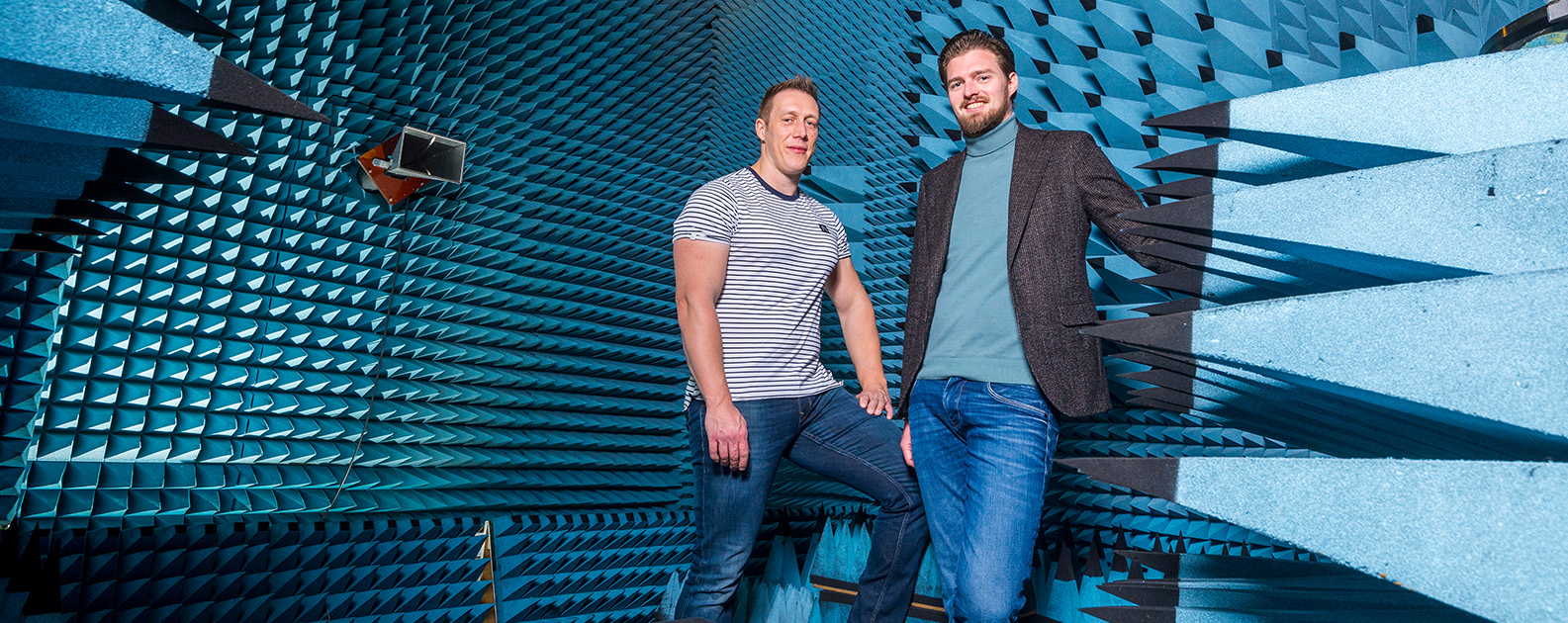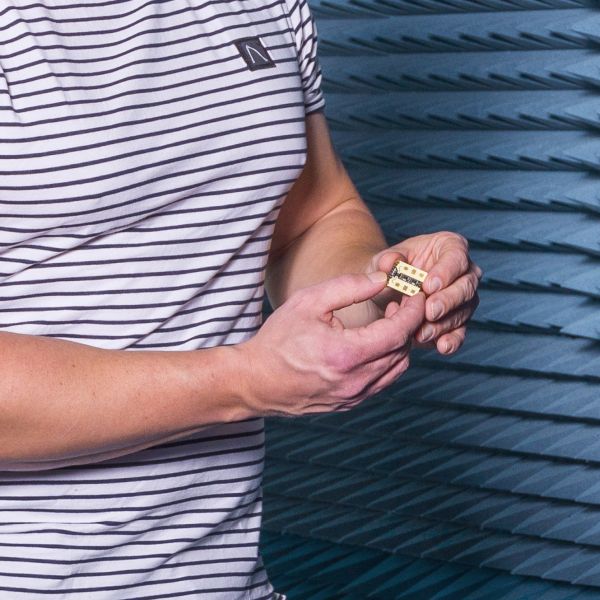Who cares for the carers? HealthTech start-up Valtes are building a healthy smart home
How do you work, raise kids, and take care of an elderly parent at the same time? Juggling informal caregiving with other commitments like a job or education, and finding time to look after themselves is a struggle many families will recognize. And with an ageing population and increasing pressures on the formal healthcare system, it’s a problem that face even more families in the future. TopDutch HealthTech start-up Valtes is tackling this challenge. They’re leveraging sensor technology and AI to build a smart home that takes care of the caregivers.

TopDutch-based entrepreneurs John Beuving and Erjen Derks are developing technology to reduce the mounting pressure on family caregivers. “We want to make social impact with our health technology,” says John Beuving with determination. “The entrepreneurship just comes with it.” Since last summer, John Beuving has focused, together with Erjen Derks, on developing a smart relief package for informal carers.
This ‘smart relief package’ is a modular, accessible technology that provides peace of mind, information, support and freedom for informal carers and other caregivers. By applying sensor technology and AI, Valtes can detect if the dependent has had an accident, or is in an unsafe situation, while the carer is not around. It also can provide the caregiver with personalized information and assistance, based on their situation and needs. In early 2023, the first pilots will start at 20 households in Drenthe. “By 2030 we want to have at least one million European users.”
A healthy, smart home
The name Valtes was chosen to reflect the product’s accessibility. “This name was derived from the letters of Vesta, the Roman goddess of home and hearth,” said Erjen. “Our ultimate aim is to create a healthy and intelligent home by installing a sensor ecosystem in the home of each person requiring care. This keeps informal carers and other carers informed about the health status of the person they care for via an easy-to-use app. They are automatically alerted when needed.”

The idea was conceived in the football canteen of VV Beilen, a football club in Drenthe where John and Erjen met each other. Over the course of a conversation, both of them concluded that they wanted to start a business and contribute to society in a practical way. John, with twenty years of experience in the world of artificial intelligence, had been working in elderly care for about ten years, where his main focus was on technology. Shortly before that, after four years of service, Erjen stepped down as alderman of the municipality of Midden-Drenthe, where he had been responsible for, among other things, preventive healthcare.
Not surprisingly, social issues also occasionally came up in the football canteen. One spring day, the conversation wound up on the topic of the future of informal care. It’s perhaps one of the biggest problems we will face in the coming years. We need to use technology to solve that, they decided.
Aging population and staff shortages
“When we first began pitching the idea to family and acquaintances, the problem turned out to be even bigger than we had previously thought,” John stressed. “We heard stories of overworked informal carers who had to combine caring for a loved one with a job and raising children and so, as a consequence, scarcely had time for themselves. A rapidly ageing population, a longer time spent living independently and staff shortages will significantly increase the pressure on informal carers in the future.”
The figures are telling: there are currently only fifteen potential informal carers for each person over 85. By 2040, this will be around six. In other words, while the demand for informal carers will skyrocket in the coming years, the availability of informal carers is decreasing sharply. At the same time, the average age of informal carers is increasing, making care tasks more difficult and, in particular, more demanding. There is a constant threat of burnout. And that is exactly what John and Erjen want to try to prevent with Valtes by offering informal and formal carers peace of mind and freedom.
Triple Helix Cooperation
It’s been an intensive few months for the entrepreneurial duo. The company recently received a grant from the province of Drenthe to further develop the application together with Drenthe College, a vocational education institute. This is to make the app available to people with different levels of language proficiency. The first pilots will start at twenty households in Drenthe in early 2023. “We have already made considerable progress, but we want to get as complete a picture as possible of the problems and identify the real wants and needs of informal carers,” said John. “Problems form the basis of everything. Only then should we look at which technology we could leverage to solve them. So in addition to running the pilots, we are in constant dialogue with healthcare organizations, informal care consultants and, of course, the informal carers themselves.”
Problems form the basis of everything. Only then should we look at which technology we could leverage to solve them.
John Beuving, co-Founder and CTO of Valtes
Privacy and security
The same themes keep coming up in those conversations: privacy, security and physical integrity. Of course, they must all be guaranteed. In fact, the whole system is built around it. But how is this done exactly? Or rather, what should informal carers expect from technology?
“We are building a system that will pick up all the Wi-Fi signals in a house,” Erjen began to explain. “We can pinpoint disruptions in the Wi-Fi signals caused by human activity using artificial intelligence. By mapping these changes in real time, you can see whether someone is standing, lying down, sleeping or has fallen over. In time, we may even be able to detect breathing and heartbeat using those existing Wi-Fi signals. The information is used to provide a continuous feed to the app using artificial intelligence. Our ultimate aim is to spot, for example, problems such as dementia, depression and loneliness early by correlating walking patterns with breathing and heart rate patterns. The ultimate sensor, as we call it.”
Market Readiness Program
After developing the concept, the entrepreneurs were alerted to a Market Readiness Program organized by N.V. NOM, the Investment and Development Agency for the TopDutch region. A ten-week, part-time program, the goal is to test an entrepreneur’s assumptions regarding their customers. They jumped at the opportunity. “We're both pretty eager to learn,” John laughed. “We want to do what we do properly from the outset. Although the first prototypes have already been realized, we are not ready to storm the market yet. However, we saw how the Market Readiness Program could accelerate that.”

Start-up ecosystem
1. A nation of start-ups The Netherlands is a top-five start-up hotspot in Europe, with a government committed to supporting the innovation-leaders…
1. A nation of start-ups The Netherlands is a top-five start-up hotspot…
Read moreThey have since run through all the sessions and completed the program. Did it actually benefit them? “Yes, absolutely,” Erjen replied without a shadow of doubt. “The biggest takeaway concerned the ‘ultimate sensor’ I mentioned earlier. Interviews with informal carers and care organizations showed that some of the things they want to know cannot be solved with Wi-Fi alone. That’s why we decided to offer a comprehensive sensor ecosystem, which means with even more possibilities, including keeping carers informed of patient’s health status outside the home. In a nutshell, the Market Readiness Program has changed the way we have tailored our product.”
John also looks back on NOM’s program with a good feeling. “What was also confirmed during the interviews,” he said, “is that a large group of informal carers do not want to call themselves informal carers at all. They are even upset when that happens. Because, they are, in their opinion, simply caring for a loved one. However, in social terms, this is a concern. Indeed, it could in fact be one reason why certain policies do not stick.”
Astronomical ambition
Work is currently ongoing with the University of Groningen to build a data privacy model. In addition, an antenna is being developed with ASTRON, a renowned institute for radio astronomy, that accurately maps Wi-Fi signal disturbances even at limited range. Especially for this project, ASTRON plans to bring students from Eindhoven University of Technology on board and the Wireless Data Lab will be made available.
So there is no shortage of enthusiasm and commitment from organizations. A good thing, because Valtes' ambition is immense. “We want to have at least one million European users by 2030,” Erjen stressed. “We want to grow and become a successful company, but always while making a social impact as our main driver.”

TopDutch Professional
"*" indicates required fields

